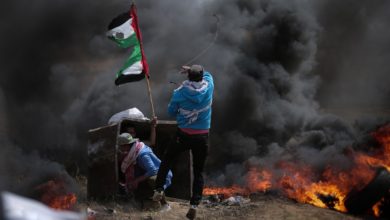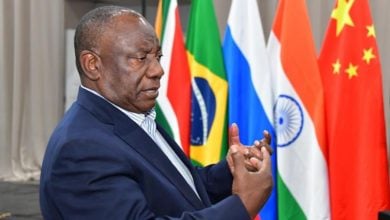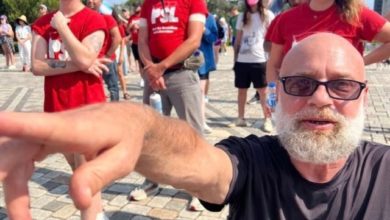The sun rises and sets as if it were the same every day, but that was not to be on Monday, April 2, 2018. That day was different because it took with it one of the greatest and most gallant anti-apartheid fighters of South Africa. The news of Winnie Mandela’s passing vibrated immediately thereafter; for even those who had not heard to feel that something had happened that day. The wails of those who cried echoed throughout as they bounced on the great mountains to reflect the message to different corners of the world to be heard by all.
This is a fighter who was married but remained unmarried in her life. This is a fighter that took up a war against apartheid because apartheid had declared war against her people. This is the fighter who was in the forefront to lead and not shout from behind and had to face the barrel of the gun to protect those behind her. This is the fighter who never minced or decorated her vocabulary with semantics or synonyms in attacking and describing the naked brutalities of the apartheid system. This is the fighter who would appear in the aftermath of gruesome apartheid massacres to comfort widows of the husbands she never met or knew. This is a fighter that embraced people as if they had been acquaintance for years simply because of her charisma and love for her people. For the struggle, she was everywhere as a mother, as a neighbour, as a comrade and as a fighter wherever the fires were raging.
Her stand against apartheid was unequivocal, categorical and uncompromising. It defied and went beyond to leave the apartheid and its masters amazed and perplexed. At a time when it was illegal to wear any regalia of banned organisations, the judge questioned her about wearing African National Congress (ANC) colours in court; she told the judge not to interfere with her wardrobe. She literally unbanned the ANC and made it more known to the people than before. At a time when restrictions barred her from interacting with people and participating in any political activities, she always found a way of continuing to organise as she had been doing. At a time when she was subjected to humiliating and degrading conditions of detention without trial, she came out with the “A Luta Continua” spirit even stronger and more determined than before. She was baptised by the struggle of the people and obdurated by the cruelty of the apartheid system and at no time was deterred into surrendering.
To silence her voice and diminish her participation, the apartheid system decided to remove her from the eyes of the public and communities she lived in. That was done through numerous arrests that led to solitary confinements with no communication to the outside world for several months. On being released she would be slapped with restriction orders that confined her to a defined and limited area within SOWETO purposely to make it impossible for her to continue with normal everyday life. When that failed to yield expected results, the apartheid regime uprooted and dumped her in a small and little known town of Brandfort in the Free State. The defiant spirit of Winnie Mandela turned attention of the country and world to the town she was banished to and soon the town was proud of the new inhabitant, and strengthened its involvement in the fight against apartheid. Having run out of ideas and alternatives, the apartheid government just let her return to SOWETO instead of flaring up other fires elsewhere.
Failing to demoralize and break that calibre of spirit, the apartheid security machinery embarked on a smear campaign to tarnish and destroy her image, reputation and the respect she commanded in the community and struggle as a whole. The campaigns were intensive, insensitive and destructive. They were conducted and commanded by a focused propaganda machinery that had the Security Branch hounding and sniffing every place for her, police harassing her, and the Stratcom coordinating the plan. The depth of that propaganda system’s intentions was demonstrated by its malicious nature and tactics applied and the extent to which it could spread its wings beyond the boundaries and oceans to coordinate with apartheid’s allies, ready to make its headlines. These are the perfect tactics from the same script used against many revolutionaries and progressive forces fighting against exploitation and oppression throughout the world.
Any person close to Winnie Mandela was watched and marked as a potential recruit to spy on specific issues of her everyday life. Targeted also were friends of her two daughters, as was the case with one photographer for a local magazine who refused the offer and temptation to do so. The campaign created rumours and also banked and exploited to the hilt any mistake or unfortunate situation that Winnie Mandela could be engulfed in. With her dedicated involvement, bravery and uncompromising stand, somewhere in between, like any human being, she was likely to trip, and that became a feast for the propaganda machinery.
The turbulence of the eighties marked the worst era for the apartheid system because the writing was on the wall. Apartheid’s attempts to halt the impossible, led to it doing the unthinkable. That was when the worst atrocities, murders, disappearances, invasions were ferociously used against apartheid opponents, activists and organisations. As a mother, Winnie Mandela had to endure the pain of seeing children bludgeoned and massacred in the streets of the townships during the 1976 Student Uprisings. As a comrade she had to endure the pain of witnessing the abductions and elimination of fellow comrades. As a community figure, she had to endure seeing family being destroyed and devastated by the brutalities of the system as members were killed. She shared the pains of mothers who had to bury children who fell in the battlefield of streets of the townships, felt the pains of mothers who did not know the whereabouts of their children, whether they were dead, kidnapped or in exile. Mama Winnie saw it all, but amidst all that she remained steadfast, guidef by cardinal points of struggle during those trying times.
Where there was supposed to be a family, it was Mama Winnie alone who had to raise the children. At that particular age of their lives they did not understand what was happening. It was Mama Winnie who had to endure the pain of a mother, watching and wiping away tears as the children bore the brunt of being Nelson Mandela’s children. She had to feel the pain of her children whose lives were disrupted as their presence in any school caused security police harassment to the point of being removed. The little of what remained as a family could be uprooted and torn asunder by harassment and removal from society. As the mother she missed important and significant moments of seeing her children grow up due to detentions and her children having to live with friends and relatives whilst away. She had to bear the experiences of returning home after all that to start all over again. She had to watch the children bear the pain and torture as if they were the ones in prison serving life sentences instead of their father. She had to experience the pain of her children watching their mother, their only shield and protector, being brutalized and tormented by the apartheid security police without protection of anyone in the house.
When the new democracy was born in 1994, Winnie Mandela looked forward to a peaceful and restful life after all the years of suffering, and more important, to be part of re-building a new South Africa. She wanted to work and see the new democracy fulfil the dreams and aspirations of those who fought, died and suffered the wrath of the brutality of the apartheid system. She joined the Parliament as a member from 1994 to 2003. In that period she also served as Deputy Minister for Arts and Culture. She remained true and loyal to what she believed and never compromised the spirit of being a critic whenever political direction went astray.
For people all over the world still struggling for justice, peace and all other forms of oppression, they would be proud that in South Africa there was a freedom fighter who advanced the same struggle from another angle. It was the same struggle that demonstrated that humankind as a whole will never capitulate to any force that inhibits the betterment of humanity and the world they live in. It was testimony to the fact that “you never choose the world you were born into, but posterity will judge you accordingly for bequeathing that world to it without making it a better place.” That rallying call unified the struggles of the world and people like Winnie Mandela, Rosa Parks, Linda Brown heeded the call. Those who lived to witness the changes brought by the blood and sweat of gallant fighters like these, learn that freedom was not free, there was always a price to pay.
That is why people of South Africa, joined by the neighbors, the continent and the world as whole dip their banners to pay tribute to the mother of the nation. The voices and message of condolence came from all directions and corners of the world as testimony to the world she touched and inspired in many different ways. She leaves South Africa a far better place, but still far from what the struggle to free South Africa was supposed to have accomplished. Along the journey to her resting place, the guard of honour, including those who will be there in thoughts and spirit, will be lined by those she leaves behind. They will continue the struggle to complete the revolution and ensure that the vision of the Freedom Charter lives. They will prevail to ensure that all the people of South Africa enjoy the fruit of freedom that they all fought so hard for. After the long walk, after all the triumph and tribulations, the people of South Africa joined by the world as a whole say, thank you very much Mama Winnie. Rest In Peace.
Mosala Mosegomi was a teenage student activist in South Africa who was imprisoned before the 1976 Soweto Uprising. During his life in exile in the United States in the 1980s, he worked closely with many Anti-apartheid organisations. He returned to South Africa and is working in the maritime sector.





